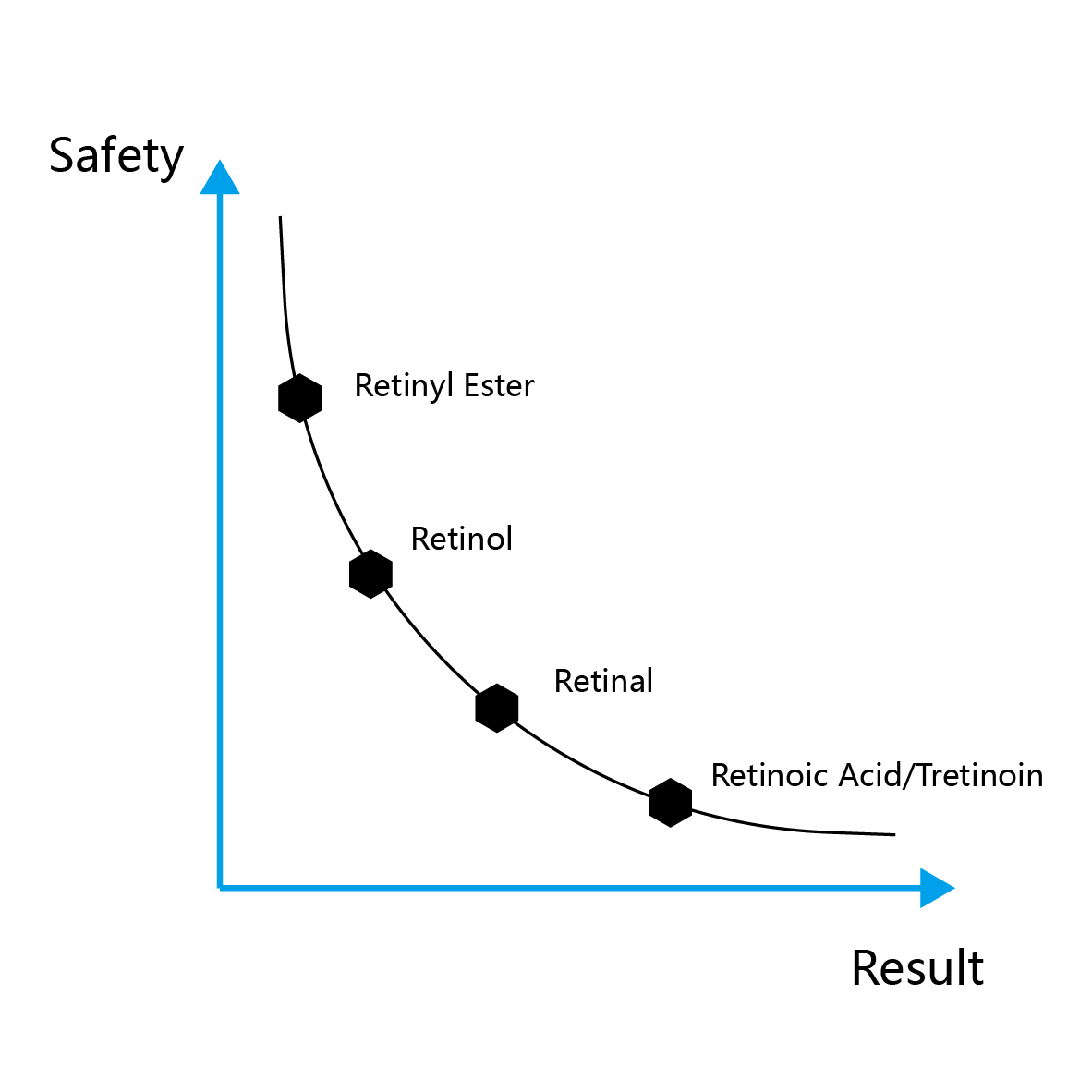What you need to know about Retinol and the use in EU market
1. Brief introduction of Retinol
Retinol has been one of the most popular ingredients for many years, as it works great on skin for anti-aging. Many people at the age of 30 realize it is time for them to start preventing aging. Retinol catches their eyes, but most of them can't figure out what Retinol is.
Broadly speaking, Retinoic Acid/Tretinoin, Retinol, Retinal, Retinyl Ester were considered the same as Retinol for most people and work similarly, but they are different.
⦁ In Retinyl Ester, Retinyl Palmitate and Retinyl Acetate are commonly used in cosmetic products. Because it is harder to be an oxidant than another; in other words, it is milder to the skin and not less easy to lead skin irrigation. For the contract, they are less effective than their ‘siblings,’ as they have to transform to Retinol to work on skin.
⦁ Retinol penetrates the skin straight and is absorbed, but it still needs to transform to Retinoic Acid to work, so it is less effective than its Acid but better than its Ester. The irritation is between them.
⦁ Retinal, not commonly used in cosmetic products, may be because Pierre Fabre owns the patent but it has been invalid since 2017. Its result is similar to Retinol.
⦁ Retinoic Acid/Tretinoin, the most effective ingredient compared to its 'siblings.' But because it is too strong, it will lead to severe irritation on the skin. It is forbidden for cosmetic purposes only for OTC

2. What does Retinol do for skin?
As we know Retinol is good at anti-wrinkling and reducing fine lines, but it is far beyond that; it can,
⦁ Anti-wrinkles
⦁ Skin brightening
⦁ Oil control
⦁ Accelerates cuticle metabolism
⦁ Reduces inflammation
3. Side effects of Retinol
We suggest starting with a low percentage of a Retinol product to let your skin establish tolerance. Side effects might be different for each person include
Redness
Itching
Dryness
Peeling
Sensitive to light
4. New regulation for Retinol, Retinyl Acetate, and Retinyl Palmitate in the EU market.
Retinol is not regulated by (EC) No 1223/2009 until 2023. In 2016, SCCS issued a report stating that Retinol is a safe ingredient in cosmetics, but in 2022, SCCS revised the report, pointing out that Retinol poses a potential risk to human health if the percentage is up to a certain level.
Now under the latest EU regulation, the maximum percentage of Retinol that can be added to a body lotion is 0.05% RE, while it is 0.3% for the leave-in and rinse-off products.

From November 1, 2025, products containing Retinol must comply with this regulation or be forbidden to be sold in the EU market.
5. Why does the EU restrict the Retinol level?
For years, SCCS has consistently shown concerns about retinol (Vitamin A), as frequent use may lead to excessive vitamin A levels in the body. Although vitamin A is vital for life, excessive intake has been linked to various health issues such as congenital defects and liver dysfunction.
6. What should the brand owners do?
Countries beyond the EU such as the US, still don't have regulations on Retinol for cosmetics; brand owners can still keep using their previous formulas, but we should know a high percentage of Retinol might lead to skin irritation and better use mild Retinol to avoid this problem.
In the EU market, changes always mean opportunities. Brand owners must understand this new regulation to avoid further loss; therefore, there are still months for brand owners to communicate with their suppliers to adjust their Retinol products’ formula.
The product result will decrease as the percentage of Retinol. At this time, we need to replenish other anti-wrinkle and similar ingredients to ensure the products will really help customers. How to make a good formula matrix is a wisdom.
Contact us for your new Retinol product journey.
FAQ
Q: Can pregnant women use retinol products?
A: There is no evidence that the use of Retinol products affects pregnant women, but there is a risk of fetal malformations if ingested in large amounts during pregnancy.
Q: How long does it take to get results after using Retinol products?
A: Anti-wrinkle is a long process; we need to let our cells generate collagen to replenish the gap in the dermis. If you keep using it, it needs around 1 month to see results. If you have deep wrinkles, you need longer.
Q: Which retinol to avoid?
A: Retinoic Acid is forbidden in cosmetic products; use it only under the direction of a physician.
Q: What do Asians use instead of Retinol?
A: Maybe some people find out Retinol is not as popular as in other countries. Instead of Retinol, some brands are using Ginseng, some brands are mixing them together. Ginseng is one of the traditional herbal medicines in Asia.
Related articles

Get more information
If you have any comments or good suggestions, please leave us a message; later our professional staff will contact you as soon as possible.
© 2025 RYSUN. All Rights Reserved. Privacy Policy | Terms and Conditions | Sitemap








Facebook
Instagram